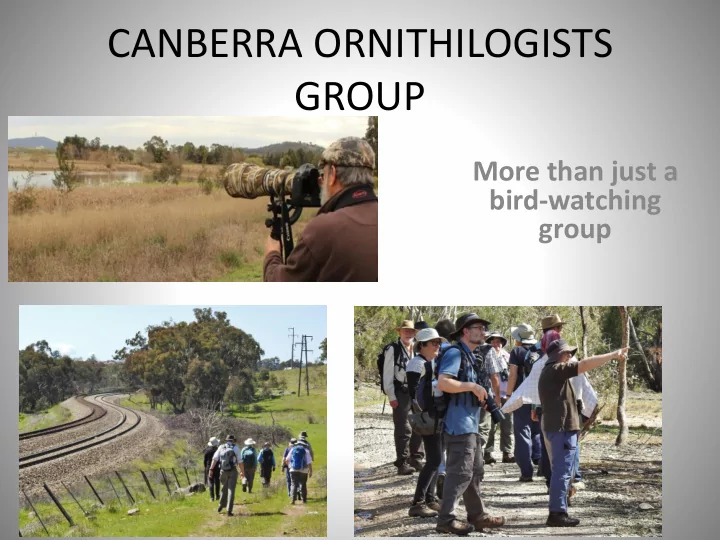

CANBERRA ORNITHILOGISTS GROUP More than just a bird-watching group
COG – what is it? • Dedicated to the conservation of birds and their habitat • 50 years old • 30 years of data on birds • Contributes to environmentally sensitive and sustainable development in the ACT • Works with a range of partners and the community White-winged Choughs
How do we do this?
Data Collection – surveying and monitoring • Database informs future planning to conserve and maintain ACT birds in the landscape • Surveying and monitoring data collected over 30 years Typical Grassy Woodland Species – White -eared Honeyeater, Leaden Flycatcher , Rufous Whistler
Data Collection – surveying and monitoring • Includes : 21 years of woodlands survey 35 years of Garden Bird Survey 10 plus years of waterbird surveys in Jerrabomberra Wetlands in the ACT and Lakes George and Bathurst Jerrabomberra Wetlands Nature Reserve
COG works with a number Partnerships of partners: • ANU • Woodlands and Wetlands Trust • ACT Conservation Council • CIMAG • ACT Government • Greening Australia Bush-stone Curlew Jerrabomberra Wetlands Nature Reserve
Research • A range of research activities supported • Canberra Bird Conservation Fund Supports ANU and Canberra University PhD students doing research work on birds Survey at Jerrabomberra Wetlands 14 projects to date
Citizen Science • Citizen science - Gang- gang Year of the Bird project engaged community in reporting sightings of Gang-gangs over 12 months • Analysis of data to provide a much better picture of conservation needs of Gang-gangs Gang-gang Cockatoo
WHAT HAVE BEEN OUR SUCCESSES?
Conservation Role • Strong conservation stance about the natural landscape in the ACT • COG has influenced decision-making by ACT Government agencies in urban development • Data assisted with conservation of the endangered Yellow Box/Redgum grassy woodland ecological ecosystem
Case Study - Mulligans Flat • Data gathered since the 80s • Grazed leasehold earmarked for urban development • Baseline data highlighted ecological value and importance of the large area of Yellow Box/Redgum grassy woodland New Suburb of Casey
Case Study - Mulligans Flat • Mulligans Flat was declared a reserve in 1995 due to the survey and monitoring work by and lobbying of government by COG and other groups • Now one of the largest and most important Yellow Box/Redgum grassy woodland areas under public protection • Site of a large scale woodlands research and restoration experiment with the re- introduction of locally extinct Mulligans Flat Woodland Sanctuary species
Case Study - Throsby • COG data contributed to government decision to include area of the proposed new suburb of Throsby in Goorooyaroo Nature Reserve • Superb Parrot surveys contributed significantly Goorooyarroo Nature Reserve to outcome
Case Study - Throsby • Reduces the development footprint in Throsby • Will help protect Superb Parrot breeding trees Superb Parrots only EPBC Act 1999 listed species regularly visiting Canberra Superb Parrot
Listing of Threatened Species • Data contributed to listing of several bird species under ACT legislation Scarlet Robin • Species threatened include Scarlet Robin, Brown Hooded Robin Treecreeper, Hooded Robin Brown Treecreeper
Where to from • Helping to preserve the Here “Bush Capital” • Contribute to build the bird knowledge base • Maintain ongoing research • Continue survey work in Greening Australia’s K2C program Gang-gang Cockatoo feeding young
Where to from Here • Continue work with the Woodlands and Wetlands Trust on the re- introduction of the Bush- stone Curlew • Develop further citizen science activities such as more Bird of the Year projects • Continue to raise community awareness about the importance of birds in the landscape Grey Cuckoo-shrike feeding young
Recommend
More recommend